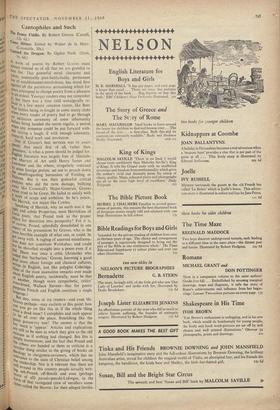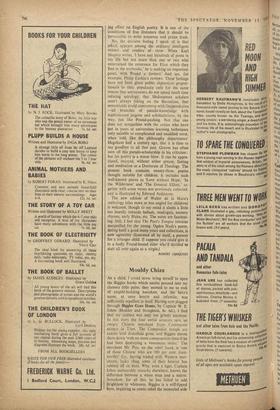Cantophiles and Such
Th
Co ne Hither. Edited by Walter de la Mare. (Constable, 30s.)
ing effect on English poetry. It is one of the conditions of free literature that it should be permissible to write nonsense and praise trash.
No, the decisive feeling I speak of is that which appears among the ordinary intelligent writers and readers of verse. When Karl Shapiro writes, '1 have met hundreds of poets in my life but not more than one or two who entertained the reverence for Eliot which they find in the textbooks,' he is making an important point, with Pound a fortiori. And see, for example, Philip Larkin's reviews. These feelings have not been given public expression propor- tionate to their popularity only for the same reason that astronomers do not spend much time refuting astrology, that Shakespeare scholars aren't always taking on the Baconians, that semanticists avoid controversy with Ouspenskyites —all branches of pseudo-knowledge with sophisticated jargons and scholasticisms, by the way, just like Pound-pushing. Not that one does not sympathise with the critics who have put in years at universities learning techniques only suitable to complicated and muddled verse, when told, ,like the philosophy departments' Hegelians half a century ago, that it is time to say goodbye to all that jazz. Graves has often seen off this pseudo-scholarship in his criticism: but his poetry is a worse blow. It can be appre- ciated, enjoyed, without either prayer, fasting and meditation or a Doctorate of Theology. The present book contains twenty-three poems thought suitable for children. It includes such well-known pieces as 'Love without Hope,' In the Wilderness' and 'The General Elliott,' to- gether with some verses not previously collected, and is illustrated by Edward Ardizzone. The new edition of Walter de la Mare's anthology (also more or less angled for children) is welcome, though to my mind it slants a little too heavily towards ballads, madrigals, nursery rhymes, early Blake, etc. The notes are fascinat- ing. Still, I feel that The Poet's Tongue remains unequalled, for the young. Ogden Nash's poem, dating back a good many years and collections, is now agreeably illustrated all by itself, a present for a younger child. (I suppose you could give it to a badly Pound-bound elder who'd decided to start all over again as a virgin.)
ROBERT CONQUEST















































 Previous page
Previous page